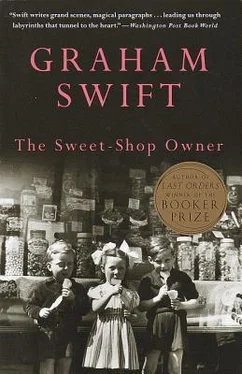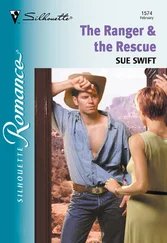Graham Swift - The Sweet-Shop Owner
Здесь есть возможность читать онлайн «Graham Swift - The Sweet-Shop Owner» весь текст электронной книги совершенно бесплатно (целиком полную версию без сокращений). В некоторых случаях можно слушать аудио, скачать через торрент в формате fb2 и присутствует краткое содержание. Год выпуска: 2012, Издательство: Vintage Books USA, Жанр: Современная проза, на английском языке. Описание произведения, (предисловие) а так же отзывы посетителей доступны на портале библиотеки ЛибКат.
- Название:The Sweet-Shop Owner
- Автор:
- Издательство:Vintage Books USA
- Жанр:
- Год:2012
- ISBN:нет данных
- Рейтинг книги:4 / 5. Голосов: 1
-
Избранное:Добавить в избранное
- Отзывы:
-
Ваша оценка:
- 80
- 1
- 2
- 3
- 4
- 5
The Sweet-Shop Owner: краткое содержание, описание и аннотация
Предлагаем к чтению аннотацию, описание, краткое содержание или предисловие (зависит от того, что написал сам автор книги «The Sweet-Shop Owner»). Если вы не нашли необходимую информацию о книге — напишите в комментариях, мы постараемся отыскать её.
The Sweet-Shop Owner — читать онлайн бесплатно полную книгу (весь текст) целиком
Ниже представлен текст книги, разбитый по страницам. Система сохранения места последней прочитанной страницы, позволяет с удобством читать онлайн бесплатно книгу «The Sweet-Shop Owner», без необходимости каждый раз заново искать на чём Вы остановились. Поставьте закладку, и сможете в любой момент перейти на страницу, на которой закончили чтение.
Интервал:
Закладка:
She rubbed her nose and straightened a crooked stack of magazines. She glanced at Mr Chapman, pressing her point, but he merely shrugged. He wasn’t bothered, oh no. He should have sacked the girl weeks ago. No wonder he couldn’t manage his own daughter.
She huffed. That child. But she remembered — taking out some new Reveilles from below the counter and counting them — how he had touched her, Terry Cooper, in the dark, that night. It was in the air-raid shelter. First on the arm and then on the knee. Bombs were falling outside, slithering through the sky like tiles; and a man was touching her in the dark. Mum and Grandpa feet away. His fingers were inside her blouse. That was action, that was excitement; something was happening in her life. And later he had married her, fathered two louts on her, then upped and gone. And now, the years had passed — she lifted the magazines onto the counter — and she didn’t want action any more, only peace.
12
Irene wrote: ‘Dear Willy, Father went again to the doctor’s today. Mother made him. His heart’s no better. He’s been told to stop work completely and rest, but of course he won’t. The laundry is losing money. I think he believes nothing will be salvaged out of it after the war unless he stays on personally. He talks of “saving the business”. Then again, he says it isn’t the money — “Money won’t bring Jack back”. It’s a matter of principle. I don’t know what he means by principle. I’ve never known him distinguish principle from money before. Anyway, he won’t stop work. He upsets Mother. He wants to make her responsible for everything. And he makes demands of me, wants me by him. Well he’s ill, it’s not like earlier in the war. I try to be patient. But I won’t have any part in the laundry — that’s his affair. I’ll stick to the Food Office. He’s not going to be penniless anyway, even if the business folds. And most of that money was never his in the first place. Perhaps this is the time to tell you. It came from Mother, and she would never have had it herself if it wasn’t for her three brothers being killed. That’s how the laundry was started. It can’t have all gone. You don’t make money in a war, but there’s not so much to spend it on either. I know for a fact he put a large sum into Government stock when the war started, in order to do his bit, and he swears he’ll never touch it again now Jack’s dead. Perhaps that’s “principle”. Well, we’ll see. It’s hard to know what his reasons are, the way he behaves. You should have seen him shout at Mother for insisting he went to the doctor’s, and later, apparently, he had a long row with the doctor himself. Then afterwards he says to me, “I’m not ill, am I Reny, my heart’s all right, isn’t it?” — as if he’d quite believe me if I agreed. I try to put up with him. He swears there’s nothing wrong with him, he won’t give up the laundry. And all the time he gets more fanatical about the war. We must win soon, he says. Jack’s killed, we must win and wipe all the Germans off the map.’
18,000 ration books.
The roads up over the downs were thick with traffic. Lorries, tanks, bulldozers. Troops were being moved to sealed-off training areas. Outside the American camps MPs in white helmets drove up and down in jeeps blowing whistles and waving arms at the convoys of Shermans. The skies buzzed. Something was happening.
Then, one day in June, it was still.
13
What was that? Had he slept? He woke up. Only the rain falling, heavy and thunderous, on the window ledges, gurgling in the gutters, pattering on the flowers, on the lilac bush in the back garden. Nothing had changed. Light spreading behind the pale green curtains — the blackout curtains had been lifted in April; and on the dressing-table the things she’d packed away at the beginning of the war — the Derby figurines, the silver hand-mirror — all replaced unharmed. See, we endure.
Only rain. ‘Go back to sleep,’ she whispered. Her hair was matted over her forehead. And then he remembered what day it was, the day allotted for victory, and that he ought to be glad (though something stopped him rejoicing) to be there to share it with her.
Victory, victory. The word was uttered and re-uttered on the wireless — how slow they were to make the final announcement — until it sounded brittle and dry: Victory. Yet, outside, rain was falling, drenching the spring leaves. Already flags had been hung from windows, and in the streets on the far side of the common bunting was stretched from roof-top to roof-top, bonfires stood prepared. Would they burn with all this rain? And he too had hung a Union Jack over the front porch (it would be sodden now, wet and drooping), for one must do one’s bit; and she had watched him from the front path — momentarily alarmed when he leant too far from the upstairs window — arms folded, unsmiling.
‘Go back to sleep,’ she said, as if he’d woken in needless agitation. But he wanted to lie and listen to the rain hissing and sluicing beyond the window.
Soon history would be honoured. With cheers, with hymns, with jubilation. Yet how still it seemed. As the day broke, the rain eased, sparrows started under the guttering …
He had got a special leave, on compassionate grounds. Her telegram had arrived at the camp: ‘Father very ill. Please come.’ And so he’d journeyed up to London, on the eve of victory.
‘There’s hope,’ said the sister with a practised smile, ‘he’s a strong man.’ But how weak he looked, lying in the ward (there were no more private beds) among flying-bomb victims in the last stages of recovery or decline — jaw dropped, lips blue, the expression, as at Jack’s memorial service, frozen, utterly taken aback. As if there were some trick; this couldn’t happen like this. Mrs Harrison sat on his left, Irene on his right. Other patients were listening to wirelesses and he wanted to know — it was the one thing for which he still seemed to rally — ‘Is there any news? Have we won?’ He might have been asking the result of a race. ‘No, not yet’ — it was Irene who spoke — ‘soon.’
White sheets, white rows of beds; the white apron of a nurse saying, ‘I think it better if you went now.’ May 8th, 1945. An orderly was mopping the floor. She walked down the corridor, leading her mother, her lips pressed tight.
There was a fancy-dress parade on the common, planned for after Churchill’s speech. Little children dressed in costumes made from cardboard and old blackout material would be exhibited as ‘Freedom’ and ‘Hope and Glory’. Then the parties would follow (already they were queueing in the High Street for food and beer): bonfires, dancing. ‘Let’s go,’ he said. They sat in the garden listening to the exultant wirelesses; the sun shone after the rain. But she looked up: ‘What about Father?’ ‘The hospital said there’s no change. And Aunt Madeleine’s with Mother.’ But he knew that her question was only a kind of excuse.
Sparks flew upwards into the blue evening sky. Along the house-fronts coloured lights were arranged in Vs, candles in jam-jars perched on front walls. They were spilling in and out of the Prince William, singing ‘Shine on, Victory Moon’. Pianos in the street; kisses for anyone in uniform; children banging dustbin lids; and out on the flattened ground of a bomb-site, tables set up, drinks, tinned meat sandwiches, a Victory Pudding (bread, milk and saccharine — the feast of victors) and the bonfire (‘bomb-fire’ the children insisted), sparks flying upwards, upwards. Speech! Speech! Someone wanted to make a speech. A stout patriarch whose sons even then, perhaps, were encamped beyond the Rhine, stood up, swayed, but only got as far as ‘Three cheers for Victory!’ Victory! Victory! echoed the cry. But no one used the other word that had hissed gently in the falling rain: Peace.
Читать дальшеИнтервал:
Закладка:
Похожие книги на «The Sweet-Shop Owner»
Представляем Вашему вниманию похожие книги на «The Sweet-Shop Owner» списком для выбора. Мы отобрали схожую по названию и смыслу литературу в надежде предоставить читателям больше вариантов отыскать новые, интересные, ещё непрочитанные произведения.
Обсуждение, отзывы о книге «The Sweet-Shop Owner» и просто собственные мнения читателей. Оставьте ваши комментарии, напишите, что Вы думаете о произведении, его смысле или главных героях. Укажите что конкретно понравилось, а что нет, и почему Вы так считаете.












